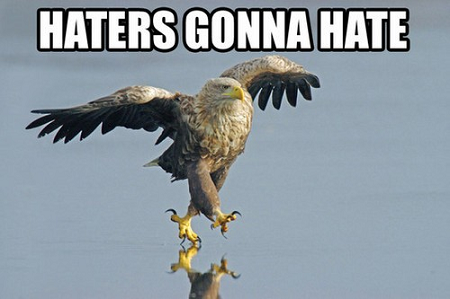Let me make this clear: bullying is an incredibly destructive force. And since the rash of bullying-related suicides, it’s inspiring to see how we as a society are addressing it. Unfortunately, there are times when things seem to head into . . . overkill. It’s imperative to teach kids they shouldn’t be dicks to others just because they’re different, but we also need to teach kids that not all forms of criticism and hurt feelings automatically equate to bullying.
The word hater has become the de facto term for anyone who doesn’t like something. And I hate it. Yes, I’m a hater hater. But there’s a reason for it: not liking something doesn’t automatically make someone a hater.
It started innocently enough: a couple of “reality TV stars” (not actually a job) use the term haters to describe people who don’t like them. No big deal. But of course, “hater” became this big huge umbrella under which anyone with a negative opinion fell. You don’t like certain kinds of music? Hater. You don’t approve of someone’s public behaviour? Hater. Film critic Scott Tobias says that he doesn’t like The Blind Side? The writer of the book calls him a “hater.” Although, if I have to pinpoint the exact moment the hater phenomenon jumped the shark, I’d say it was around the time Glee tried to convince us that dodgeball was considered bullying.
While I appreciate that we are slowly trying to distance ourselves as a society from those who use people considered “weak” to make themselves seem “strong,” you also have to take into consideration that, sometimes, there is grounds for criticism. The easiest way to tell actual bullying from criticism is this: confront a bully. If, when asked to look at the reasons behind his dislike, the bully turns into a sputtering mess with no real grounds for his opinion, that’s bullying. But sometimes, and I know this must come as a shock to a few of you, people just don’t like things. Not everyone is going to like and dislike the same things.
I want people to start getting real about making bullying a thing of the past, but that’s not going to happen if we inflate every minute grievance into a personal assault. Believe me, everyone’s feelings are hurt sometime, but you can’t always assume it was with meant with harm. Humans are imperfect creatures, and most of the time, hurt feelings are more accidental than intentional. I’m not saying people don’t have the right to be offended; I’m just saying that we need to take into consideration that the people who hurt us are still human and not inherently malicious. People are generally good if you give them a chance. Dumb as hell, but good.
And if not, a swift kick in the ass never hurt anyone in the long term.

 Why you can trust Xtra
Why you can trust Xtra


